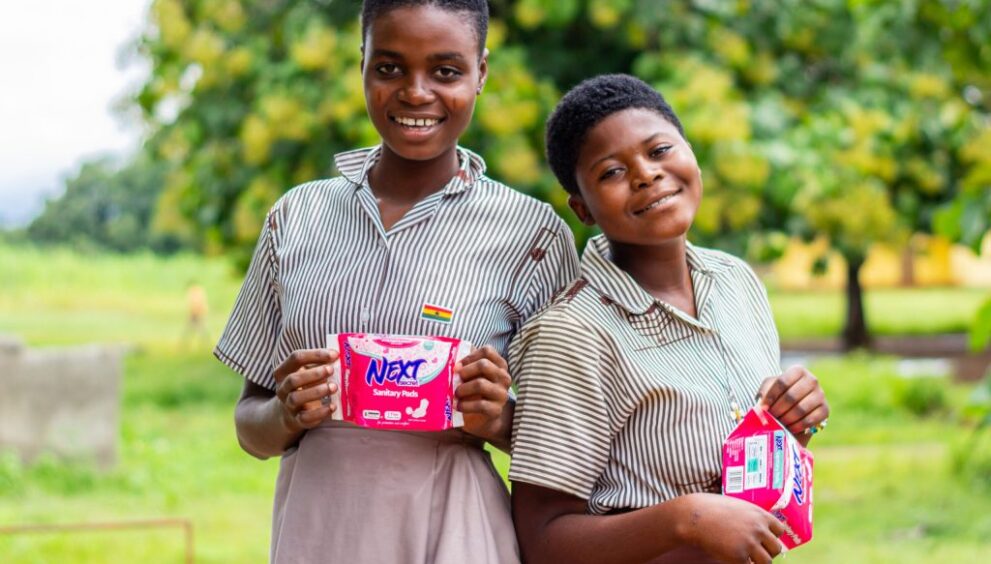For countless women and girls across Ghana, the monthly menstrual cycle remains shrouded in discomfort, stigma, and uncertainty, despite recent improvements in the availability of disposable sanitary pads. Menstrual health extends far beyond the mere management of bleeding, it directly impacts educational attainment, personal dignity, reproductive and sexual well-being, and even physical safety.


“ Menstrual health is not just about managing bleeding—it affects women’s education, their personal dignity, reproductive and sexual well-being and even safety ”
Dr Abena K. Karikari
A comprehensive, multi-country analysis of Performance Monitoring for Action (PMA) data in 2024 revealed that 34.2 percent of Ghanaian women still report unmet menstrual hygiene needs, a rate markedly lower than Burkina Faso’s 74.8 percent or Ethiopia’s 69.9 percent, yet still signaling a persistent problem for more than one in three women. Rural districts outside Accra and Kumasi are disproportionately affected, where access to reliable products and private facilities remains precarious.
In the Eastern Region, a 2024 cross-sectional study of senior secondary schoolgirls found that although nearly all respondents used disposable pads, 43 percent still practice poor hygiene due to inadequate information on proper usage and disposal.
Insights gathered by Poka Health App in mid-2025 paint a revealing picture of urban, educated Ghanaian women’s menstrual experiences. Among women aged 32 to 38 with tertiary degrees living in Greater Accra or abroad, nearly all still rely on disposable pads for comfort, affordability, and accessibility, despite frequent reports of skin irritation, itching, and painful rashes.
Only a small minority seek professional medical advice for these issues, underscoring a troubling gap in menstrual health literacy and lingering cultural taboos that discourage frank conversations with healthcare providers about period-related complications.
Globally and regionally, similar themes emerge. Landmark trials in Kenya demonstrated that girls provided with clean menstrual cups experienced lower rates of bacterial vaginosis and sexually transmitted infections. Studies in Ethiopia and Nigeria highlight that three-quarters of women there lack consistent access to clean pads and private sanitation, leading many to miss school or engage in transactional sex to afford menstrual products.
South Africa’s distribution of free pads in some schools has alleviated certain pressures, yet shortages and stigma persist, especially in rural townships. Ghana’s April 2025 rollout of free sanitary pads for schoolgirls represents a bold policy step, and early feedback suggests improved attendance in pilot regions. Nevertheless, Poka’s respondents emphasize that distribution alone is insufficient; it must be paired with robust education on proper use and hygiene practices to ensure lasting benefits.
Transforming menstrual health in Ghana demands an integrated, multi-pronged strategy. School curricula should introduce menstrual education early and include boys to normalize dialogue and dismantle taboos. Subsidised or free distribution programmes must be bolstered by community-level champions who can demonstrate correct usage, disposal, and care techniques in local languages with visual aids. Faith-based and
community groups can serve as vital partners, leveraging existing networks to encourage supportive conversations. Efforts to diversify supply chains, by introducing affordable reusable options alongside disposable pads, can reduce environmental waste and long-term costs, while robust monitoring and research will help policymakers and practitioners refine interventions based on real-time feedback and impact metrics.
Menstrual hygiene is not merely a private concern but a matter of public health, gender equality, and human dignity. By listening to women’s voices through tools like the Poka Health App and combining education with accessible product options, Ghana can move closer to ensuring that every girl and woman manages her period safely, comfortably, and without shame.
Achieving this vision will require sustained political will, cross-sector collaboration, and community engagement, but the payoff in reduced school absenteeism, improved reproductive health, and empowered lives is immeasurable. A Ghana in which menstrual health is fully supported is not only ideal; it is an imperative for national progress and social justice.
Source: Menstrual Hygiene in Ghana: Bridging the gap between knowledge, practice – Graphic Online




